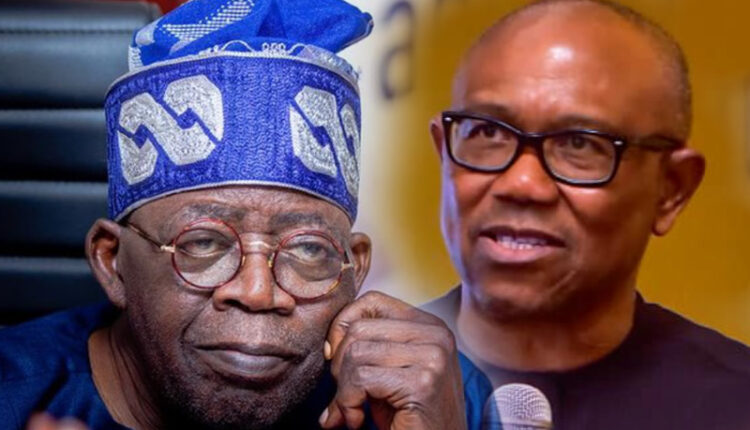The Labour Party’s presidential candidate, Peter Obi, submitted two videos in support of his petition contesting the conduct and results of the February 25 presidential election, and the Presidential Election Petition Court accepted them as evidence.
The petitioners informed the court that they had served a subpoena on Channels Television to produce the recordings found on two flash drives at the resumed hearing on Friday night through their attorney, Jubril Okutekpa, SAN.
The TV station received two separate subpoenas, dated May 30 and June 6, according to Okutekpa, who also claimed that the TV station sent one of its employees to present the requested evidence.
The five-member panel, presided over by Justice Haruna Tsammani, accepted the subpoenas as exhibits PBH-1 and PBH-2 and designated them as evidence.
The chairman of the Independent National Electoral Commission, Mahmoud Yakubu, allegedly promised in an interview he gave before the general elections that the results would be electronically transmitted in real-time on one of the flash drives.
The other includes a press conference by Festus Okoye, a national commissioner of the commission, who reaffirmed the organization’s commitment to electronically transmit the outcomes.
Lucky Obese-Alawode, a senior reporter and editor at Channels TV, was called to the witness stand in an effort to present the information in the video clips in open court.
However, the petition’s respondents vehemently disagreed with the petitioners’ action.
Because the witness’ statement was not submitted with the petition, President Bola Tinubu’s attorney, Akin Olujinmi, SAN, questioned the witness’ credibility.
Tinubu’s attorney argued that the law is clear that a petition must be filed within 21 days of the declaration of an election’s results by citing Paragraphs 4 (5) and (6) of the First Schedule to the Electoral Act 2022.
He argued that when the petition was filed, the petitioners should have included a list of all the required paperwork as well as a list of the witnesses they intended to call to support their claims.
The law states that a petition that doesn’t follow the rules won’t be approved. My lords, the witness’s statement was served to us after the proceedings got underway today.
“This has been going on for more than three months since the election results were announced.
“Neither the petitioners’ list of witnesses nor his statement were included in the petition. Accordingly, he is not a qualified witness who can give evidence in this court, according to Tinubu’s attorney.
He argued that although the petitioners did not include it in their list of supporting documents, they were aware that they would rely on the aforementioned video recordings when they filed the petition.
In agreement with Olujimi, SAN’s objection, the INEC argued that Obi and LP should have included the proposed evidence in their petition through the representation of Kemi Pinhero, SAN.
However, the petitioners’ attorney, Okutekpa, SAN, argued that because the subpoena was a court order over which he had no control, the witness was qualified to testify.
Despite the objections, the panel allowed the two flash drives to be used as evidence and designated them as Exhibits PBH-3 and PBH-4.
Once more, the respondents objected when the petitioners’ attorney asked to play the contents of the flash drives in open court, with the exception of the electoral commission, which exhibited no dissent.
According to Olujimi, his client was not provided with a copy of the flash drive.
He added that playing the video clips without his clients being aware of their content might deny them the chance to have a fair hearing.
This case is not a hide-and-seek game, he declared. We have a right to receive a copy so that we can familiarise ourselves with the information and make preparations. We won’t consent to it being played until we are served.
According to Solomon Umoh, SAN, the attorney for the All Progressives Congress, it would be an ambush if the petitioners played the data on the flash drives without first serving it on the respondents.
In his decision, Justice Tsammani, the chairman of the five-person panel, stated that the respondents’ position is not prejudiced against playing the video clips but rather on their lack of prior service.
Tsammani, however, decided to postpone the case until Saturday, June 10, so that the video clips could be viewed in public.

